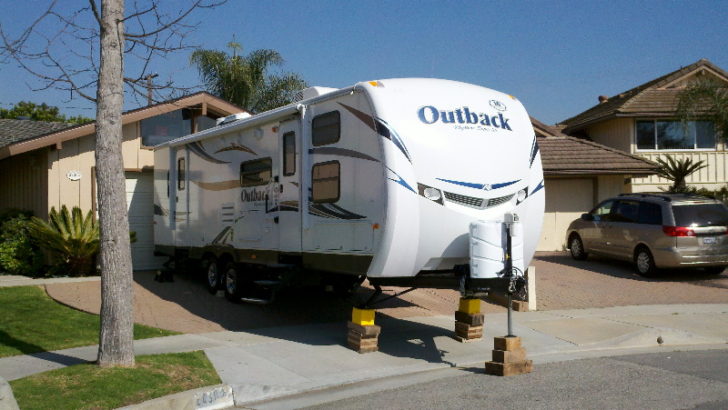
Your Complete Guide To Successful Driveway Camping
Driveway camping, driveway surfing, courtesy camping, moochdocking, whatever you want to call it, being offered free overnight RV accommodations is a beautiful thing. Chances are if you travel by RV, you’ve had friends and relatives generously offer you a night or two in their driveway or yard.
In the past five years of full-time RV living, my husband and I have had the good fortune to driveway camp at relative’s houses and in the yard’s of good friends. Several times we even took up the offers of strangers to stay in their driveways.
Not only is driveway camping free (and fun), but it’s also a great way to visit acquaintances without being a nuisance. I like to joke that we are the best kind of house guests — the kind who bring their own house with them!
Driveway camping can be convenient and rewarding, but it can also be a potential hassle if you don’t do your homework ahead of time. Driveways are not campgrounds, and as such require a bit of extra planning and knowledge for successful RV parking.
Know the rules
Sigh…like life, driveway camping is often dictated by a set of rules. Rules imposed by communities and homeowners associations that are increasingly unfriendly to RVs.
Because the last thing you want is to cause trouble for your gracious hosts, be sure to check the municipal, county, and homeowner association ordinances for your destination before you get there.
We ran into this problem when parked in my dad’s driveway in the Florida Keys. At the end of week two, we got a visit from a town official who informed us that living in an RV outside of a campground is NOT allowed on Big Pine Key.
Luckily, we were at the end of our planned stay anyway, and she only gave us a warning instead of a hefty fine. Lesson learned. Always check the rules ahead of time. And never assume that just because you see other RVs in driveways and yards that this practice is allowed.
Will you fit?
Aside from not breaking the community rules, the number one consideration when driveway camping is will you fit?
RVs come in a wide range of sizes and shapes. Therefore, it goes without saying that a campervan is going to fit in a lot more driveways than a 45-foot motorhome.
Like the rules, it’s important to figure out if you will fit ahead of time. If in doubt, have an alternate place to stay and arrive with plenty of daylight for a possible difficult entry.
RVs are big!
While your host might ensure you that there’s plenty of room, you should still ask them to measure.
It’s been my experience that non-RVers don’t have a good grasp on how much room that most RVs need. While they’re measuring for size, also ask them to take note of any low hanging trees or power lines.
And heavy!
Not only do RVs take up lots of space, but they also weigh a ton (actually, most weigh many tons). Since the last thing you want is to leave unsightly marks behind, make sure your parking spot can handle the weight of the RV.
This is especially critical if you plan to park in the yard or on the grass. Chances are you won’t be invited back if you tear up the lawn or crack the driveway.
Access is important.
Fitting the RV in the driveway or yard is important and all, but if you can’t get there it doesn’t matter how big the spot is. We stayed at my brother’s house last summer and while the driveway was plenty big enough, getting into it required a very skilled uphill back up while making a 90-degree turn.
I’m still amazed that we got in there. Ask your host ahead of time about the configuration of the driveway or yard. Are there any sharp turns? What about steep grades? Does the driveway have a significant dip or bump where it meets the street?
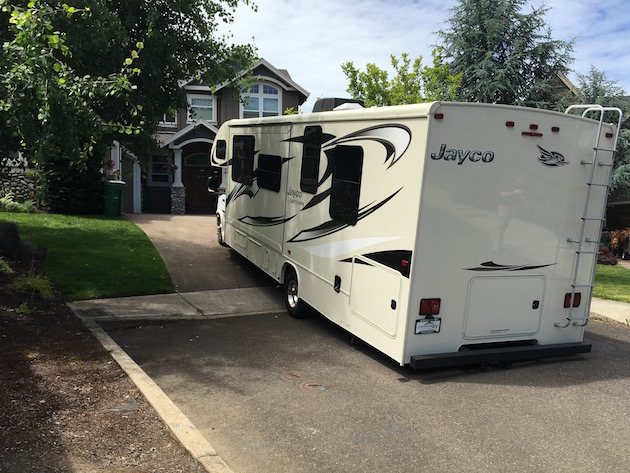
Do your homework before you arrive by plugging the address into Google Maps and studying the satellite view of the surrounding area. If the driveway requires a sharp turn when entering take note of the best direction from which to approach.
Utility hookups
The only thing better than a free place to park your RV is a free place to park your RV with utility hookups! Yes, your host will have a kitchen, a shower, and a washing machine. Yes, they will encourage (and sometimes insist) that you use these luxuries.
But let’s face it, we travel by RV because we enjoy having a bathroom and a kitchen of our own. Therefore, using your water and holding tanks is usually a given. Most RVers can easily last a few days without hookups, but it sure is nice when they are offered.
Of course, you should never assume that utilities will be available when driveway camping. The best practice is to show up with empty waste tanks, a full water tank, and the ability to be flexible with power usage. If you are offered use of utilities, here are a few guidelines to keep in mind.
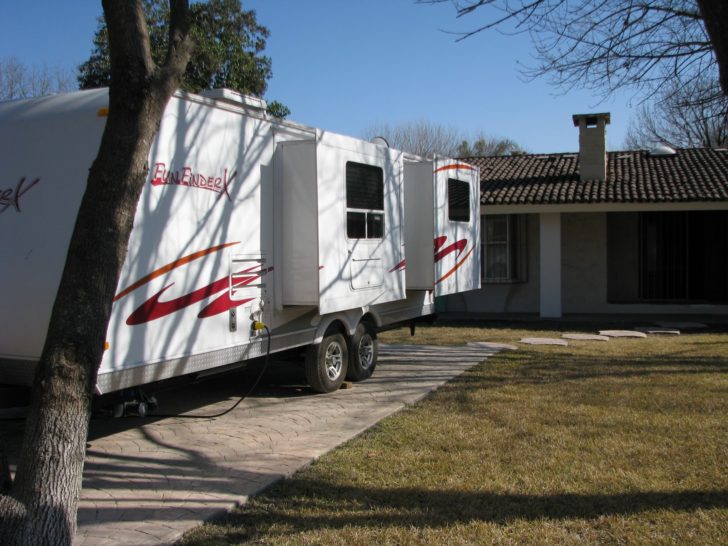
Water:
Freshwater is the easiest utility to acquire when driveway camping. All you need is a hose long enough to reach your RV.
Remember to be considerate. If the hose has to stretch 50 feet across the lawn and driveway and then drape over the porch railing it might be best to simply use the hose to fill your tank instead of leaving it hooked up.
Electric:
RVs use considerably more power than a standard household 15 amp outlet provides. This means that if you plug in you’re going to need to be mindful of your usage.
You will also need an adapter to fit your 30A or 50A plug into the 15A household outlet. Keep in mind that an adapter allows power to flow through the cord, but it won’t convert 15A into 50A. Therefore, conserving power and being mindful of how much power you’re using at one time is crucial.
In other words, don’t plug into your Grandparent’s garage outlet and expect to run the AC and the microwave while blow drying your hair. You will blow a circuit and I guarantee Grandpa won’t be happy.
Sewer:
You found a driveway camping spot with a sewer hook-up! Congratulations! This is the holy grail of RV driveway camping. You might as well warn your hosts now that you might never leave.
All joking aside if you do manage to acquire a sewer hook-up while driveway camping there are a few things to keep in mind.
- Unless this is a sewer outlet that is used often, check it first by dumping a small amount of clean water.
- Make sure your connections are tight!
- If the sewer outlet is far away, consider a product like the Sewer Solution that allows you to pump the sewage over long distances and up slight grades.
Being a good guest when driveway camping
You may have brought your own house with you, but you’re still a house guest. Try to be a good guest by being considerate, laying out expectations, and leaving your hosts a small token of appreciation.
Don’t overstay your welcome.
Set expectations regarding the limit of your stay ahead of time. If you’re staying with relatives or good friends they might offer an open-ended invitation.
This is great, but remember that you’re parking in their driveway and most likely disrupting their normal routine. Communicate with them regarding how long you plan to stay and be flexible about working around their schedule.
Give thank you gifts.
It goes without saying that you will want to give your hosts a small thank you gift. After all, they not only saved you camping fees, but most likely also offered you use of luxuries like a big shower, and (if you’re lucky) free WiFi.
Depending on what amenities you used it might be prudent to chip in a few bucks to cover utility costs. Aside from monetary gifts, here are a few ideas for how to thank your hosts.
- A home-cooked meal. Everyone likes to eat.
- A trinket from a cool place you recently visited.
- Offer to do some household chores. Things like mowing the lawn, weeding the garden, or cleaning the inside of their house.
Remember the neighbors.
Finally, keep in mind that driveway camping is not the same as staying in a campground. Chances are there are neighbors within sight who may or may not be thrilled about the presence of an RV in their neighborhood.
Try to keep the peace by being considerate. Keep noise to a minimum and don’t leave outside lights on that could shine in the neighbor’s windows.

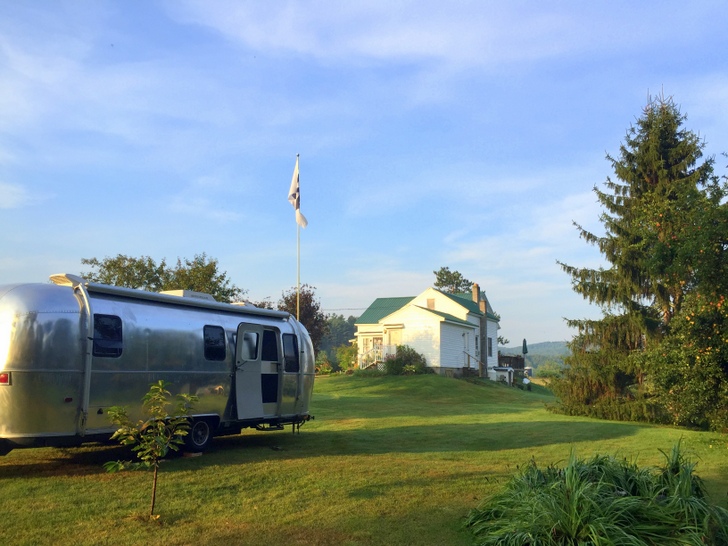
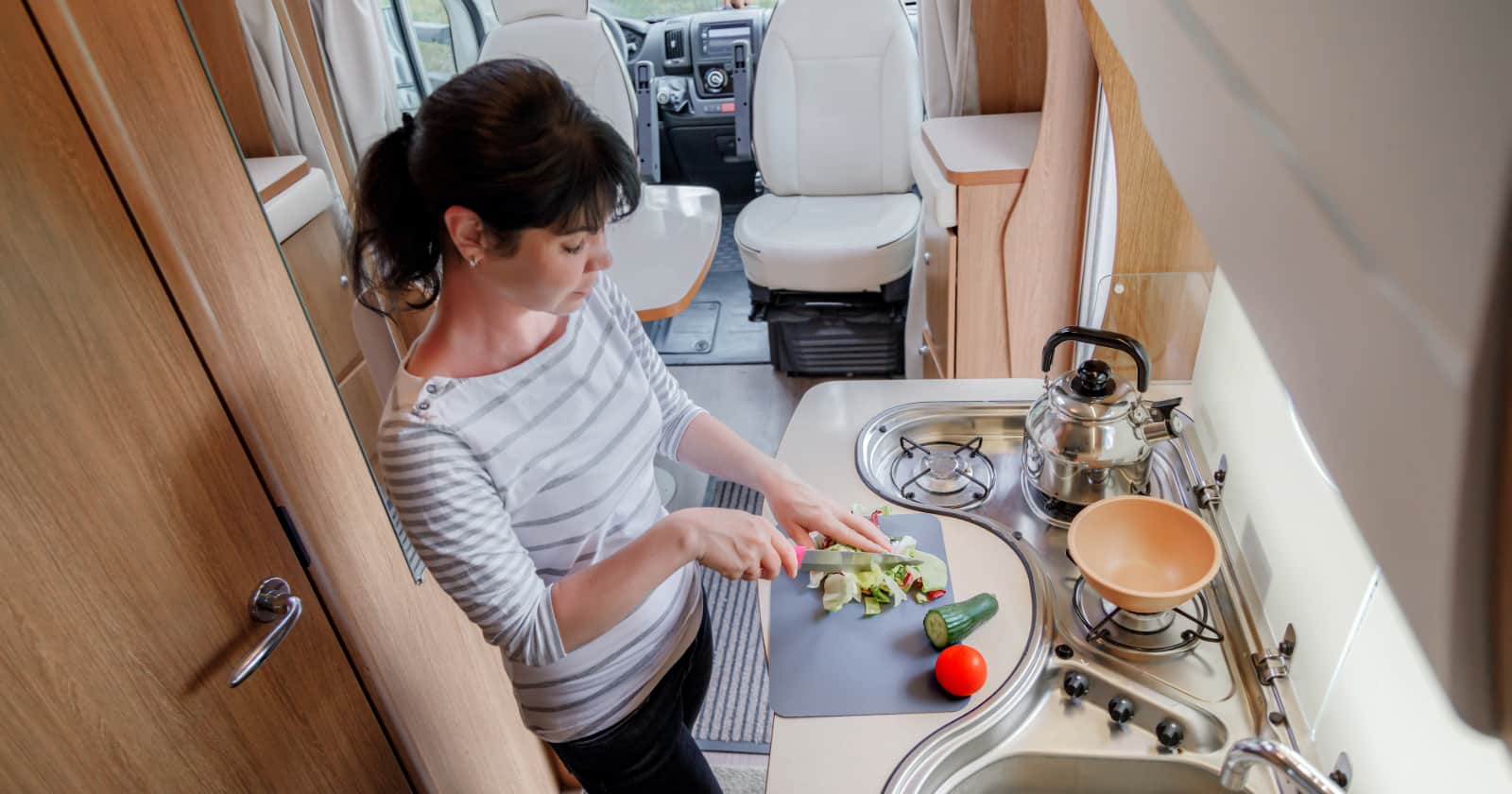

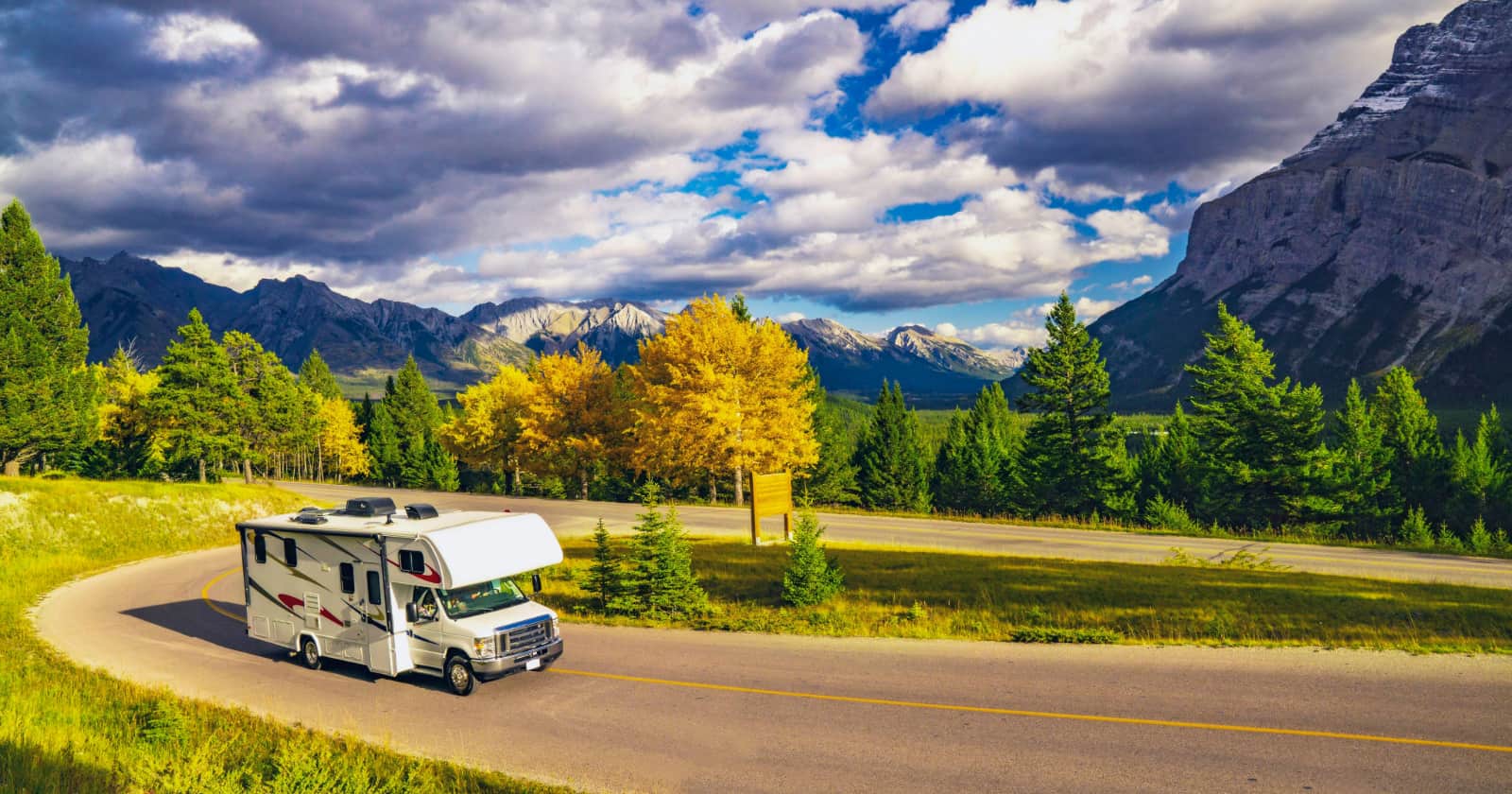
Ahh let me clarify. My class C is 30A. I’m not sure if the size of my AC unit (for some reason I’m drawing a blank). Anyway, I avoid using the AC and/or microwave when plugged into 15A.
I didn’t think you could run a 30A ac unit on 15A hookup – or at least that the start up of it could burn out your AC or fry the wires or both. Has that changed? That was something I learned right out of the gate five years ago when we started camping. Even the microwave use might be dicey.